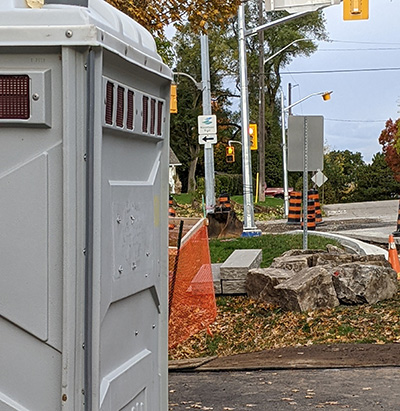New Ontario regulations to upgrade toilet and washstand facilities at construction sites and require proper-fitting work clothing should not be overly onerous to comply with says one construction lawyer but they represent a major step for female empowerment says another advocate.
The revisions to the Construction Projects Regulation take effect July 1, prompting construction employers to seek legal advice and take steps to ensure compliance.
Ontario’s Minister of Labour, Immigration, Training and Skills Development Monte McNaughton announced the new standards for construction washrooms in March, requiring among other measures for sites to have at least one women’s-only washroom where the size of the site warrants it. The legislature also requires women in construction and workers with diverse body types to be outfitted in properly fitting gear, including uniforms, boots and safety harnesses.
LIUNA has frequently addressed the need for better washroom facilities and more appropriate work gear for women in the province, said Victoria Mancinelli, LIUNA’s director of strategic partnerships.
“By removing barriers and ensuring women have access to tools to reach their full potential and advance in the industry, we will empower a stronger sense of belonging onsite while attracting talent and strengthening retention,” she commented.
“We have long advocated for improvements to PPE, removing the one-size-fits-all model and ensuring all workers have access to clean and safe facilities onsite.”

Ottawa-based construction lawyer Paul Lalonde of Emond Harnden wrote an article last month advising construction employers on the reforms. He said he has had a number of conversations with construction clients looking for guidance as the deadline approaches.
“It’s not one where I’ve seen employers be frustrated about the change or feel that the change is unnecessary, or unduly expensive, or something that would be extremely difficult to comply with,” Lalonde said. “When I’m talking to them, they’re just looking for the basics about what is it that we have to do here.
“They see it as something similar to what they’ve already had to be doing and it’s just a tweak.”
His article noted the regulations change the distance requirement related to toilet, urinal and clean-up facilities on jobsites from “180 metres, measured horizontally, from the project work area” to “not more than 90 metres where reasonably possible, and otherwise not more than 180 metres, measures horizontally, from the project work area.”
Toilets, urinals and clean-up facilities must be kept in good repair at all times; projects that require at least five toilet facilities onsite must have at least one specifically set aside for the use of female workers only, with some exceptions; and where it is not reasonably possible to have a wash basin with running water at a clean-up facility, it is required that both a means of cleaning hands and an alcohol-based hand sanitizer be provided.
Lalonde noted basic toilet facilities requirements have expanded. Each facility must have a toilet with an open-front toilet seat; a toilet paper holder and an adequate supply of toilet paper; a self-closing door that can be locked from the inside; adequate lighting, heating (if possible) and ventilation; and privacy for the user, among other requirements.
“If it was being done properly in the first place, then this wouldn’t be needed, but clearly, it’s needed,” Lalonde said.
There are many practical reasons for having proper-fitting clothing including allowing female workers to work safely, Lalonde said.
“I mean, if it’s not fitting properly, it’s very likely not doing the job for which you’re using it.”
Anticipating the July 1 deadline, Heather Ferguson, journeyperson millwright with the Millwright Regional Council Canada, commented, “We need more daughters and sons to follow us into the trades in Ontario and improved workplace hygiene and sanitation may be a new motivator to some.”
Laureen Lagace, business agent with Local 124 of the Plasterers’ and Cement Masons’ association, said the new legislation is welcome “but without enforcement, we remain in the same position.”
Lalonde said Ministry of Labour inspectors would likely pay site visits after July 1 and if they see compliance problems, they would issue an order to comply.
Then “don’t be surprised if they show up again in a couple of months to look at your site again. And if you’re still not meeting the requirements, then that’s when you may see charges.”
Follow the author on Twitter @DonWall_DCN




Recent Comments